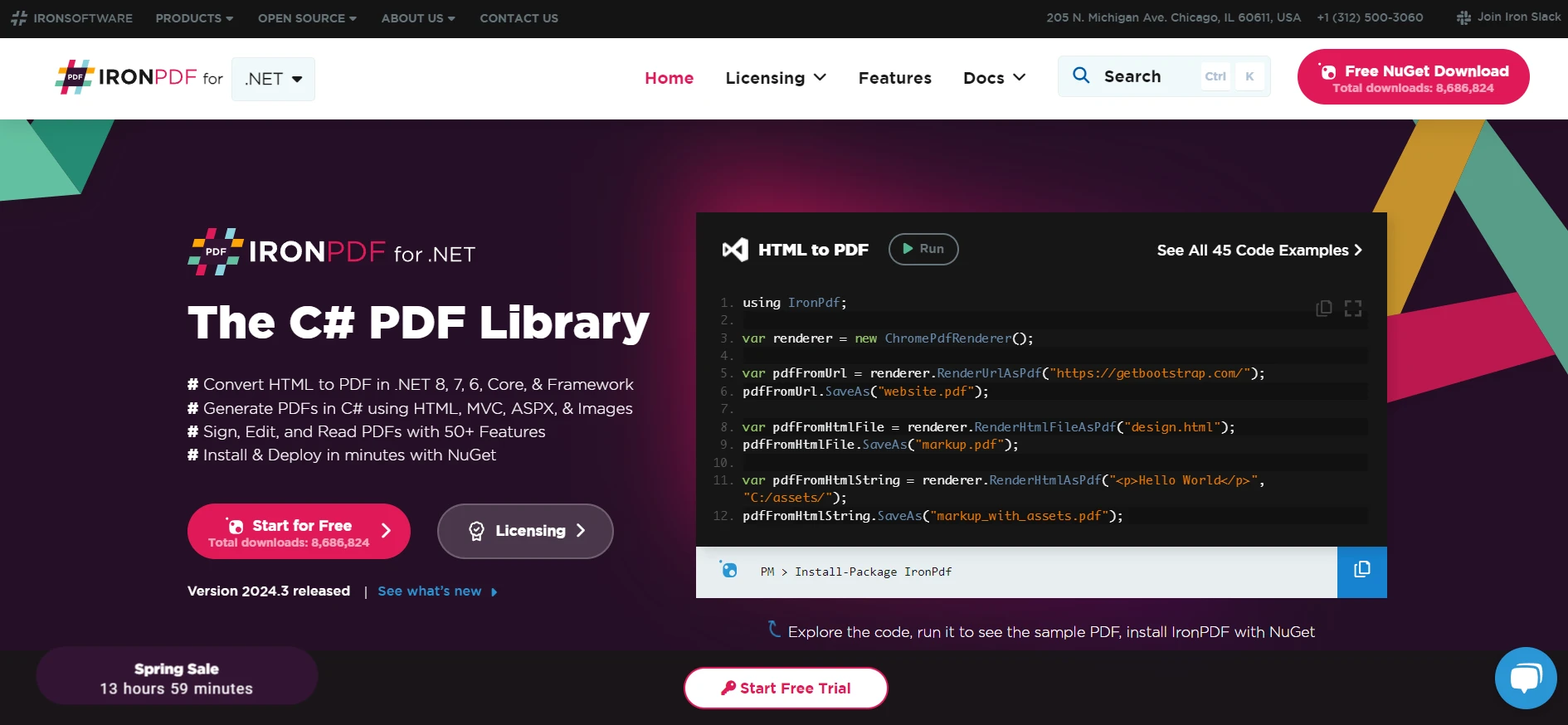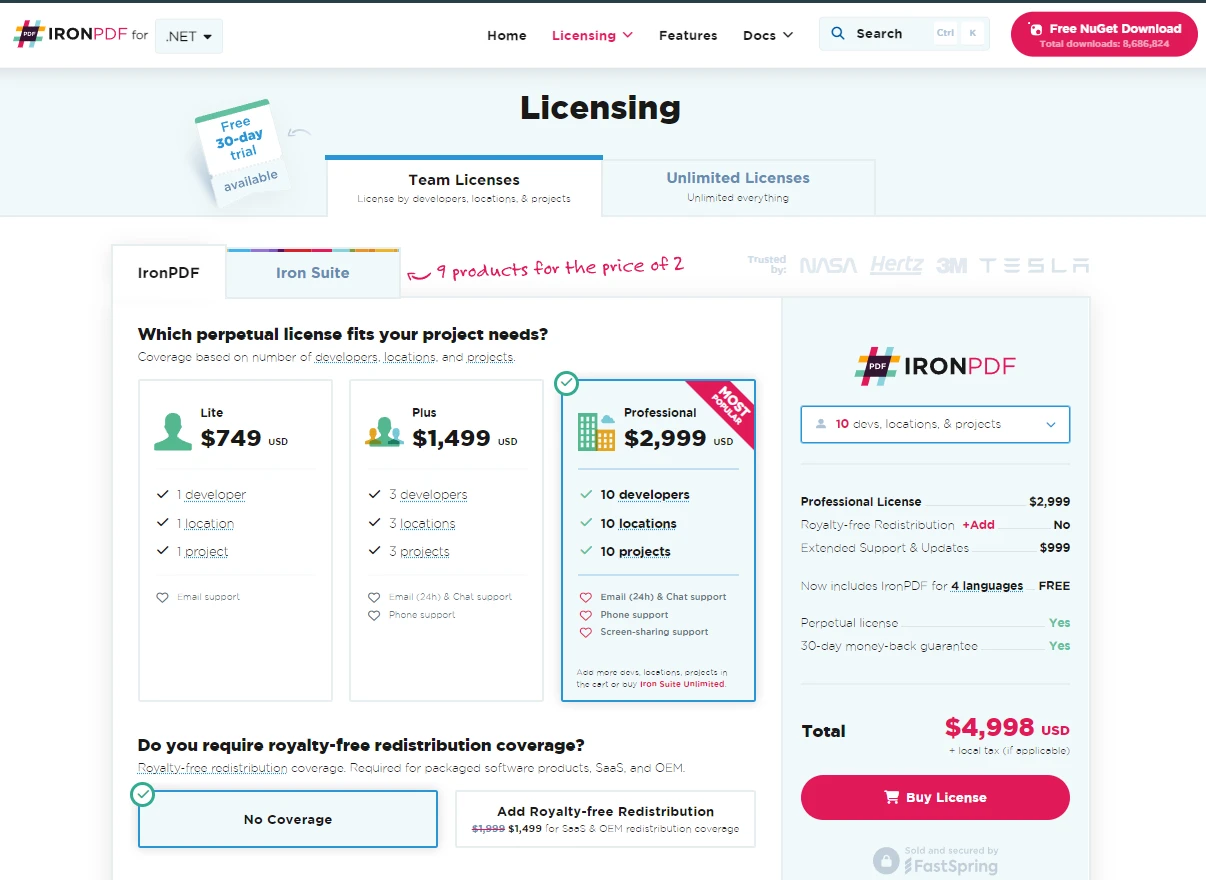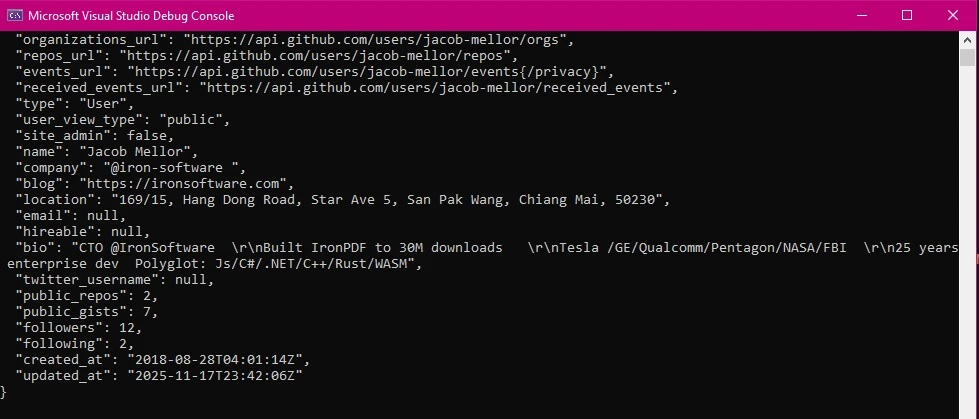C# iList (How It Works For Developers)
Introduction to the IList
IList is a part of the .NET Framework's Collections namespace. It is a non-generic collection interface that provides the blueprint for a collection of objects that can be individually accessed by their index. Unlike arrays, IList allows for a dynamic number of object value elements, meaning you can add or remove elements from the collection as needed. It serves as the base interface for all non-generic lists in the .NET Framework, offering a way to manage a collection of objects in a more flexible manner than arrays. We'll learn about the IList interface and the IronPDF C# PDF Library in this tutorial.
Understanding the IList Interface
The public interface IList declaration is a fundamental part of creating custom collections in C# that adhere to the IList contract specified by the .NET Framework's Collections namespace. IList includes properties and methods that enable accessing elements in the collection, counting them, and modifying the collection by adding, inserting, or removing elements. Here are some of the key properties and methods defined in the IList interface:
- Properties like
IsFixedSizeandIsReadOnlyinform whether the collection is of fixed size or read-only, respectively. - Methods such as
Add,Insert,Remove, andRemoveAtare used for modifying elements within the collection. You can add, insert, and remove elements. - The
IndexOfmethod is for locating elements, and theItemproperty (or indexer in C#) allows for the getting and setting of elements based on their index.
Practical Usage of the IList Interface
To showcase how IList works, let's create a simple example. This example will demonstrate how to declare an IList, add items to it, and iterate over its contents.
Creating and Modifying an IList
First, let's see how to declare an IList and add items to it:
using System;
using System.Collections;
class Program
{
static void Main(string[] args)
{
// Creating an IList instance
IList myIList = new ArrayList();
// Adding elements to the IList
myIList.Add("Hello");
myIList.Add(10);
myIList.Add(new object());
// Displaying the number of values in the IList using the Count property
Console.WriteLine($"Number of elements: {myIList.Count}");
// Accessing elements using a loop
foreach (var element in myIList)
{
Console.WriteLine(element);
}
}
}using System;
using System.Collections;
class Program
{
static void Main(string[] args)
{
// Creating an IList instance
IList myIList = new ArrayList();
// Adding elements to the IList
myIList.Add("Hello");
myIList.Add(10);
myIList.Add(new object());
// Displaying the number of values in the IList using the Count property
Console.WriteLine($"Number of elements: {myIList.Count}");
// Accessing elements using a loop
foreach (var element in myIList)
{
Console.WriteLine(element);
}
}
}In the above example, we've created an IList instance using ArrayList, a class that implements IList. We've added a mix of different types of objects to demonstrate that an IList can hold any object. Finally, we've iterated over the collection, printing out each element.
Index-Based Access and Modification
Accessing and modifying elements by their index is a key feature of IList. The following example shows how you can do it:
using System;
using System.Collections;
class Program
{
static void Main(string[] args)
{
IList myIList = new ArrayList { "Hello", 10, new object() };
// Accessing an element by index
object value = myIList[1];
Console.WriteLine($"Element at index 1: {value}");
// Modifying an element by index
myIList[1] = 20;
Console.WriteLine($"Modified element at index 1: {myIList[1]}");
}
}using System;
using System.Collections;
class Program
{
static void Main(string[] args)
{
IList myIList = new ArrayList { "Hello", 10, new object() };
// Accessing an element by index
object value = myIList[1];
Console.WriteLine($"Element at index 1: {value}");
// Modifying an element by index
myIList[1] = 20;
Console.WriteLine($"Modified element at index 1: {myIList[1]}");
}
}Implementing a Custom IList
Sometimes, you might need a tailored collection that inherits IList. This allows for more control over how elements are stored, accessed, and modified. Below is an example of a simple custom collection implementing IList:
using System;
using System.Collections;
public class CustomCollection : IList
{
private ArrayList _innerList = new ArrayList();
public object this[int index]
{
get => _innerList[index];
set => _innerList[index] = value;
}
public bool IsFixedSize => _innerList.IsFixedSize;
public bool IsReadOnly => _innerList.IsReadOnly;
public int Count => _innerList.Count;
public bool IsSynchronized => _innerList.IsSynchronized;
public object SyncRoot => _innerList.SyncRoot;
public int Add(object value)
{
return _innerList.Add(value);
}
public void Clear()
{
_innerList.Clear();
}
public bool Contains(object value)
{
return _innerList.Contains(value);
}
public int IndexOf(object value)
{
return _innerList.IndexOf(value);
}
public void Insert(int index, object value)
{
_innerList.Insert(index, value);
}
public void Remove(object value)
{
_innerList.Remove(value);
}
public void RemoveAt(int index)
{
_innerList.RemoveAt(index);
}
public void CopyTo(Array array, int index)
{
_innerList.CopyTo(array, index);
}
public IEnumerator GetEnumerator()
{
return _innerList.GetEnumerator();
}
}using System;
using System.Collections;
public class CustomCollection : IList
{
private ArrayList _innerList = new ArrayList();
public object this[int index]
{
get => _innerList[index];
set => _innerList[index] = value;
}
public bool IsFixedSize => _innerList.IsFixedSize;
public bool IsReadOnly => _innerList.IsReadOnly;
public int Count => _innerList.Count;
public bool IsSynchronized => _innerList.IsSynchronized;
public object SyncRoot => _innerList.SyncRoot;
public int Add(object value)
{
return _innerList.Add(value);
}
public void Clear()
{
_innerList.Clear();
}
public bool Contains(object value)
{
return _innerList.Contains(value);
}
public int IndexOf(object value)
{
return _innerList.IndexOf(value);
}
public void Insert(int index, object value)
{
_innerList.Insert(index, value);
}
public void Remove(object value)
{
_innerList.Remove(value);
}
public void RemoveAt(int index)
{
_innerList.RemoveAt(index);
}
public void CopyTo(Array array, int index)
{
_innerList.CopyTo(array, index);
}
public IEnumerator GetEnumerator()
{
return _innerList.GetEnumerator();
}
}This CustomCollection class encapsulates an ArrayList, a class that itself implements IList. Our CustomCollection forwards calls to the underlying ArrayList, allowing it to behave like any other collection that implements IList. This example demonstrates creating a collection that can be accessed by index, modified (items added, inserted, or removed), and iterated over, just like any built-in .NET collection that implements IList.
Advanced Operations with IList
Beyond basic add, remove, and access operations, IList allows for more complex manipulations and queries. For instance, checking if the collection contains a specific object or finding the index of an object within the collection are operations that can be essential for certain applications:
using System;
using System.Collections;
class Program
{
static void Main(string[] args)
{
IList myIList = new ArrayList { "Hello", 10, new object() };
// Check if the IList contains a specific object
bool contains = myIList.Contains(10); // Assuming 10 was added previously
Console.WriteLine($"Contains 10: {contains}");
// Find the index of a specific object
int index = myIList.IndexOf(10);
Console.WriteLine($"Index of 10: {index}");
}
}using System;
using System.Collections;
class Program
{
static void Main(string[] args)
{
IList myIList = new ArrayList { "Hello", 10, new object() };
// Check if the IList contains a specific object
bool contains = myIList.Contains(10); // Assuming 10 was added previously
Console.WriteLine($"Contains 10: {contains}");
// Find the index of a specific object
int index = myIList.IndexOf(10);
Console.WriteLine($"Index of 10: {index}");
}
}These operations can be particularly useful when dealing with collections of objects where you need to determine the presence or position of specific items without iterating over the entire collection.
IronPDF: C# PDF Library

IronPDF is a PDF library for .NET developers that allows for the creation and manipulation of PDF documents directly within .NET applications. It supports converting HTML to PDF documents, images, and web pages to PDF. Developers can easily add PDF functionalities to their applications with this library. IronPDF also includes features for editing, merging, and splitting PDF files, which provide comprehensive control over PDF manipulation.
IronPDF excels in HTML to PDF conversion, ensuring precise preservation of original layouts and styles. It's perfect for creating PDFs from web-based content such as reports, invoices, and documentation. With support for HTML files, URLs, and raw HTML strings, IronPDF easily produces high-quality PDF documents.
using IronPdf;
class Program
{
static void Main(string[] args)
{
var renderer = new ChromePdfRenderer();
// 1. Convert HTML String to PDF
var htmlContent = "<h1>Hello, IronPDF!</h1><p>This is a PDF from an HTML string.</p>";
var pdfFromHtmlString = renderer.RenderHtmlAsPdf(htmlContent);
pdfFromHtmlString.SaveAs("HTMLStringToPDF.pdf");
// 2. Convert HTML File to PDF
var htmlFilePath = "path_to_your_html_file.html"; // Specify the path to your HTML file
var pdfFromHtmlFile = renderer.RenderHtmlFileAsPdf(htmlFilePath);
pdfFromHtmlFile.SaveAs("HTMLFileToPDF.pdf");
// 3. Convert URL to PDF
var url = "http://ironpdf.com"; // Specify the URL
var pdfFromUrl = renderer.RenderUrlAsPdf(url);
pdfFromUrl.SaveAs("URLToPDF.pdf");
}
}using IronPdf;
class Program
{
static void Main(string[] args)
{
var renderer = new ChromePdfRenderer();
// 1. Convert HTML String to PDF
var htmlContent = "<h1>Hello, IronPDF!</h1><p>This is a PDF from an HTML string.</p>";
var pdfFromHtmlString = renderer.RenderHtmlAsPdf(htmlContent);
pdfFromHtmlString.SaveAs("HTMLStringToPDF.pdf");
// 2. Convert HTML File to PDF
var htmlFilePath = "path_to_your_html_file.html"; // Specify the path to your HTML file
var pdfFromHtmlFile = renderer.RenderHtmlFileAsPdf(htmlFilePath);
pdfFromHtmlFile.SaveAs("HTMLFileToPDF.pdf");
// 3. Convert URL to PDF
var url = "http://ironpdf.com"; // Specify the URL
var pdfFromUrl = renderer.RenderUrlAsPdf(url);
pdfFromUrl.SaveAs("URLToPDF.pdf");
}
}Code Example
Here is a straightforward example that demonstrates generating a simple PDF document from a list of strings using IronPDF and the IList interface:
using IronPdf;
using System.Collections.Generic;
public class PDFGenerator
{
public static void GeneratePDFFromList(IList<string> dataList)
{
// Initialize the HtmlToPdf renderer
var renderer = new ChromePdfRenderer();
// Start building HTML content from the dataList
var htmlContent = "<h1>My Data List</h1><ul>";
foreach (var item in dataList)
{
htmlContent += $"<li>{item}</li>";
}
htmlContent += "</ul>";
// Convert HTML string to PDF
var pdfDocument = renderer.RenderHtmlAsPdf(htmlContent);
// Save the PDF to a file
pdfDocument.SaveAs("DataList.pdf");
}
}
// Example usage
class Program
{
static void Main(string[] args)
{
License.LicenseKey = "License-Key";
IList<string> myDataList = new List<string> { "Apple", "Banana", "Cherry" };
PDFGenerator.GeneratePDFFromList(myDataList);
}
}using IronPdf;
using System.Collections.Generic;
public class PDFGenerator
{
public static void GeneratePDFFromList(IList<string> dataList)
{
// Initialize the HtmlToPdf renderer
var renderer = new ChromePdfRenderer();
// Start building HTML content from the dataList
var htmlContent = "<h1>My Data List</h1><ul>";
foreach (var item in dataList)
{
htmlContent += $"<li>{item}</li>";
}
htmlContent += "</ul>";
// Convert HTML string to PDF
var pdfDocument = renderer.RenderHtmlAsPdf(htmlContent);
// Save the PDF to a file
pdfDocument.SaveAs("DataList.pdf");
}
}
// Example usage
class Program
{
static void Main(string[] args)
{
License.LicenseKey = "License-Key";
IList<string> myDataList = new List<string> { "Apple", "Banana", "Cherry" };
PDFGenerator.GeneratePDFFromList(myDataList);
}
}In this example, an IList<string> is used to store a collection of fruit names. The GeneratePDFFromList method then iterates over this list, building an HTML string that includes each item in an unordered list. IronPDF's ChromePdfRenderer converts this HTML content into a PDF document, which is subsequently saved to a file.

Conclusion

This beginner-friendly guide aimed to cover the basics and practical uses of IList in C#. With examples ranging from simple usage to custom implementation, it's clear that IList is a powerful tool in the C# developer's toolkit. Whether you're manipulating collections of data or building your collection types, IList offers the functionality and flexibility needed for effective software development. IronPDF offers a free trial of its PDF library for interested users, with licenses available starting from $799.
Frequently Asked Questions
What is the IList interface in C#?
The `IList` interface is a part of the .NET Framework's Collections namespace used for creating dynamic collections that can be accessed by index. It provides methods for adding, inserting, removing, and accessing elements, offering more flexibility than static arrays.
How can you convert HTML to PDF in C#?
You can convert HTML to PDF in C# by using IronPDF's `RenderHtmlAsPdf` method. This allows you to transform HTML strings, files, or URLs into high-quality PDF documents.
What are some key methods of the IList interface?
Key methods of the `IList` interface include `Add`, `Insert`, `Remove`, `RemoveAt`, and `IndexOf`. These methods are essential for managing and modifying the elements within the collection dynamically.
How can you create a custom IList in C#?
To create a custom `IList` in C#, you can implement the `IList` interface in a class, overriding necessary methods and properties such as `Add`, `Remove`, and `IndexOf`, to customize how the collection handles its elements.
How does IronPDF create PDFs from HTML?
IronPDF uses the `ChromePdfRenderer` class to convert HTML content into PDFs. It supports conversion from HTML strings, files, or URLs, ensuring accurate PDF creation from web content.
Can you generate a PDF from an IList of data?
Yes, you can generate a PDF from an IList by iterating over the list to construct an HTML string, and then using IronPDF's `ChromePdfRenderer` to convert the HTML into a PDF document, which can be saved using the `SaveAs` method.
What advanced operations does IList support?
Advanced operations in `IList` include checking if the collection contains a specific object using `Contains` and finding the index of an object with `IndexOf`. These functions help manage collections efficiently without needing to manually search through elements.
How can you troubleshoot PDF generation issues in C#?
If you encounter issues with PDF generation in C#, ensure that your HTML content is correctly formatted and that you're using the latest version of IronPDF. Check for any exceptions thrown during the conversion process for further insights.





















